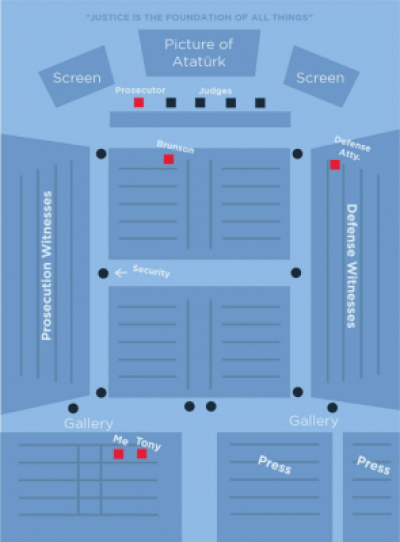Pastor Brunson's Release: A View From the Courtroom

Perhaps no international religious freedom case has gotten more attention in the United States in recent years than that of imprisoned American Pastor Andrew Brunson, who Turkey detained for over two years on politically motivated charges of espionage and terrorism. Labeled as a hated American spy, Pastor Brunson's case attracted even more attention within that country, most of it not welcome. I was visibly reminded of this as I drove past the armed troops stationed along the road leading to the detention center near Aliaga, Turkey, upon which I descended with others to monitor the latest hearing in the case against him as part of my work on religious freedom.
Entering the courtroom, we looked toward an area where three judges would sit, slightly elevated, facing us, with the prosecutor sitting alongside them. Immediately below were several administrative court personnel, and below them, at floor level, was a large, sectioned-off box of seats in which only Pastor Brunson was located. His lawyer sat way off to his right, in a section of seating which ran along that wall. Prosecution witnesses sat on the other side. Those monitoring the hearing, which included Pastor Brunson's wife Norine, sat in a row of seats along the back wall. To our right were press and other observers (the Turkish Christian supporters of Pastor Brunson were not allowed in). Ten court security officers stood watch at points around the room.
One had an odd impression staring at the large, relatively empty courtroom (it is a former gymnasium converted into a court to prosecute alleged perpetrators of the 2016 coup) from the small viewing area crammed with observers. It also felt modern and professional—a perception which could make one uneasy knowing of the show trial-like handling of Pastor Brunson's case.
The hearing opened with a girl in a wheelchair testifying for the prosecution. She said she didn't know Pastor Brunson, but she knew people who went to his church. She was questioned about whether these people were associated with terror groups. While such witness testimony might seem normal, an understanding of how the evidence has been manipulated in this case from the beginning helps one see that politics (not justice) is driving it. As she passed in front of us when leaving, I wondered what was going through her mind. What did she really think of Andrew Brunson?
Pastor Brunson was asked to respond; he stood, moved to the front of his seating box, and answered the judges' questions—respectfully as always. His attorney asked to call certain defense witnesses, but they were rejected. The distance between Pastor Brunson and his attorney made it impossible for them to communicate during this process, something which is common in court hearings in the United States, where people are permitted to assist their defense.
After this, a witness (known for making false accusations) who had previously testified that Pastor Brunson was affiliated with terrorists was called up by video. Several other witnesses were brought into court and questioned in response. When their testimony rebutted his, the witness on video began arguing with one in court, with each claiming the other was a terrorist. This contradictory testimony, along with the testimony of a defense witness who had not previously been allowed to testify, provided the day's first glimmers of hope before we recessed for lunch.
After an hour, we proceeded back into the courtroom, where Pastor Brunson and his attorney were conferring quietly, at times joined by Norine. While I knew he was leaning on his faith for strength and encouragement, these events were still quite taxing on him. Shortly into the afternoon session, the positive developments continued when the prosecutor said he would be discarding some previous prosecution witness testimonies. The judge then denied requests by two secret prosecution witnesses to be heard again—the first time a prosecution witness was refused!
Yet our hopes soon slipped as the prosecutor launched into a lengthy reading of the original indictment, quite incredibly recommending that Pastor Brunson be sent back to jail. At this point, twenty or so reporters fled the courtroom, presumably to file stories. On the heels of these increasingly suspenseful developments, the judges announced another short recess.
Things grew increasingly emotional, for no one more so than Andrew and Norine. At points throughout the day, Andrew would stand, turn around, and place his hand over his heart while staring at his wife. Norine would rise from her seat, place her hand over her heart, and stare back at Andrew. This was their way of telling each other "I love you." In addition to their faith in God, they leaned upon each other for strength throughout this ordeal.
With additional security personnel lined up in front of us, the judges began the next session by rejecting Pastor Brunson's ability to offer more witnesses. Asked to respond, he exclaimed to the court, "I am innocent," and his attorney summarized the lack of evidence against him. Again, the judges announced a short recess.
At this time, Pastor Brunson walked toward the back of his seating box. Staring at us, he broke down, shaking with silent sobs, with lowered head and shoulders slumped. Who could blame him after what he'd been through? He loved Turkey. He had only ever sought to bring the Gospel to the Turkish people—and now this! Despite the promising evidence presented earlier in the day, none of us knew how the court was going to rule, and the prosecutor had just asked that he be sent back to jail. Things were as uncertain as they had ever been. Almost to herself, Norine sympathetically responded, "stay strong, baby!"
Read more about Pastor Brunson on The Christian Post.